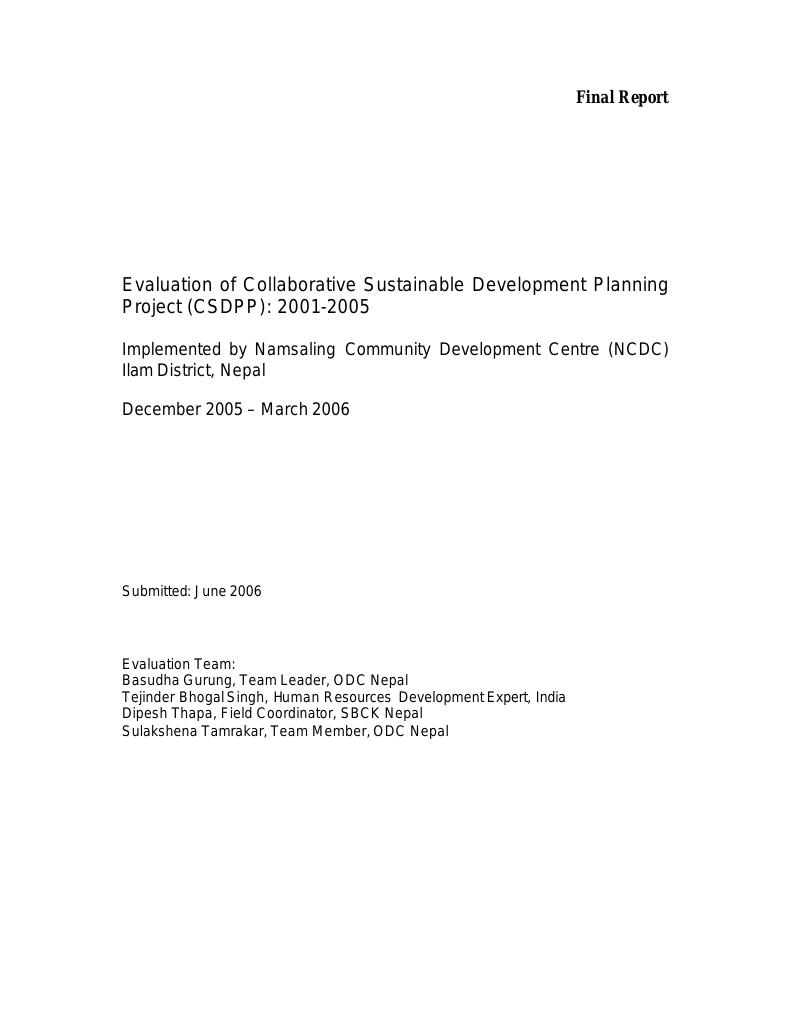Evaluering
Evaluation of Collective Sustainable Development Planning Project
Background The Collaborative Sustainable Development Planning Project (CSDPP) is implemented by Namsaling Community Development Centre (NCDC) in Ilam district, supported by The Development Fund. The project period covered by the evaluation is 2001 to 2005 (also referred as the second phase of CSDPP). The main goal of the project is "to establish sustainable development planning system for better livelihood ". The key approaches adopted are support to Sustainable Development Plan (SDP) preparation and model implementation of different development activities following SDP. This evaluation is being succeeded by institutional analysis, and a business plan development of NCDC. Purpose/objective The objective of the evaluation was mainly to assess the 5-year project (2001-2005) results in terms of efficiency, effectiveness, impact, relevance and sustainability with reference to its stated goals, objectives and outputs. The evaluation looked into the management of the project and institutional aspects of NCDC as a prelude to the next phases of institutional analysis and business plan development. Methodology The evaluation exercise has been participatory involving key stakeholders, communities, NCDC board and the project staff. The evaluation design, data collection instruments and processes, roles of evaluation team and project staff, and sample respondent groups were discussed and jointly agreed in a workshop with the project staff and key board members of NCDC. The team interacted with 30 beneficiary groups, different district level stakeholders, NCDC partners and others involved in the process. The evaluation report findings were discussed in a workshop organized in Birtamode, Jhapa and feedback collected along with further actions to address the issues raised by evaluators. Key findings - In the project period SDPs for 17 VDCs have been prepared. The project has been able to promote decentralization and good governance through preparation of SDP. The SDP development process has increased awareness among community people and VDC bodies and the benefits of the plan have proved its importance among them.- Support to Saving and Credit Organizations (SCOs) and agro-based income generating activities have contributed to income generation of the community in project intervention localities.- The issues of environmental protection and considerations, though reflected in the SDPs, did not come out as a priority.- The activities on forestry have not been able to demonstrate desired results.- The sustainable agricultural practice and waste management activities are considered the most successful interventions of the project. As part of sustainable agricultural practices organic farming using organic fertilizer and organic pesticides and cultivation of "new products" are a remarkable achievement of the Project.- The support on health and sanitation has resulted in immediate benefit, e.g., improved cleanliness of school premises and surrounding, increased awareness on sanitation and hygiene and importance of protecting water sources.- Project management in terms of planning, decision making and implementation is functioning well while monitoring and reporting of activities are the weaker elements.- The security and political instability has negatively influenced the project management, field activities and staff movement. This has meant different adjustments in the processes and activities, however the good reputation of NCDC/CSDPP in Ilam, and its strong base in the community has enabled the project to continue its operations even in the conflict situation.- As an institution NCDC is unique in supporting the VDC to develop SDPs. Its expertise on SDP preparation is a valuable asset, which NCDC should promote to other districts. Recommendations - SDP preparation: Active participation of women especially in dalit and marginalized communities has to be emphasized.- Strengthening the Collaborative nature of work: CSDPP/NCDC should build on the collaborative nature of its work and its networks and goodwill.- Sustainability of CSDPP: CSDPP should further work on mainstreaming economic and socio-cultural sustainability issues in its programme.- Monitoring, reporting and documentation: CSDPP should establish an effective monitoring system, develop skills of staff, form and activate monitoring teams (at VDC level as well for follow-up).- Documentation and dissemination: The project should develop a strategy to promote the successful practices to the community groups, concerned agencies at district level, and in case of SDP to other districts and to national policy makers.- Internal communication and coordination: It is suggested that the sectoral teams (units) of CSDPP hold quarterly review and sharing sessions.- Financial aspects: CSDPP/NCDC needs to revisit the audit recommendations made by the auditors to refine its accounting and financial management practices.- Conflict sensitivity and security of staff: NCDC should carry out a scenario planning, based on which short-term strategies to work in the current conflict and unstable political situation are developed. Comments from the organisation Any evaluation is produced within a very limited framework with regards to the composition of the evaluation team, its time available, its access to information and how it analyses the information received. Furthermore, any social reality can be analysed and presented in many different ways, among which an evaluation represents only one. Hence while this evaluation report may be useful as a tool for general learning, it has limited value as a source of information about the particular projects and partners in question. We urge any reader to consult the partners involved or Development Fund before applying this information in a way that may affect the partners and the project.
